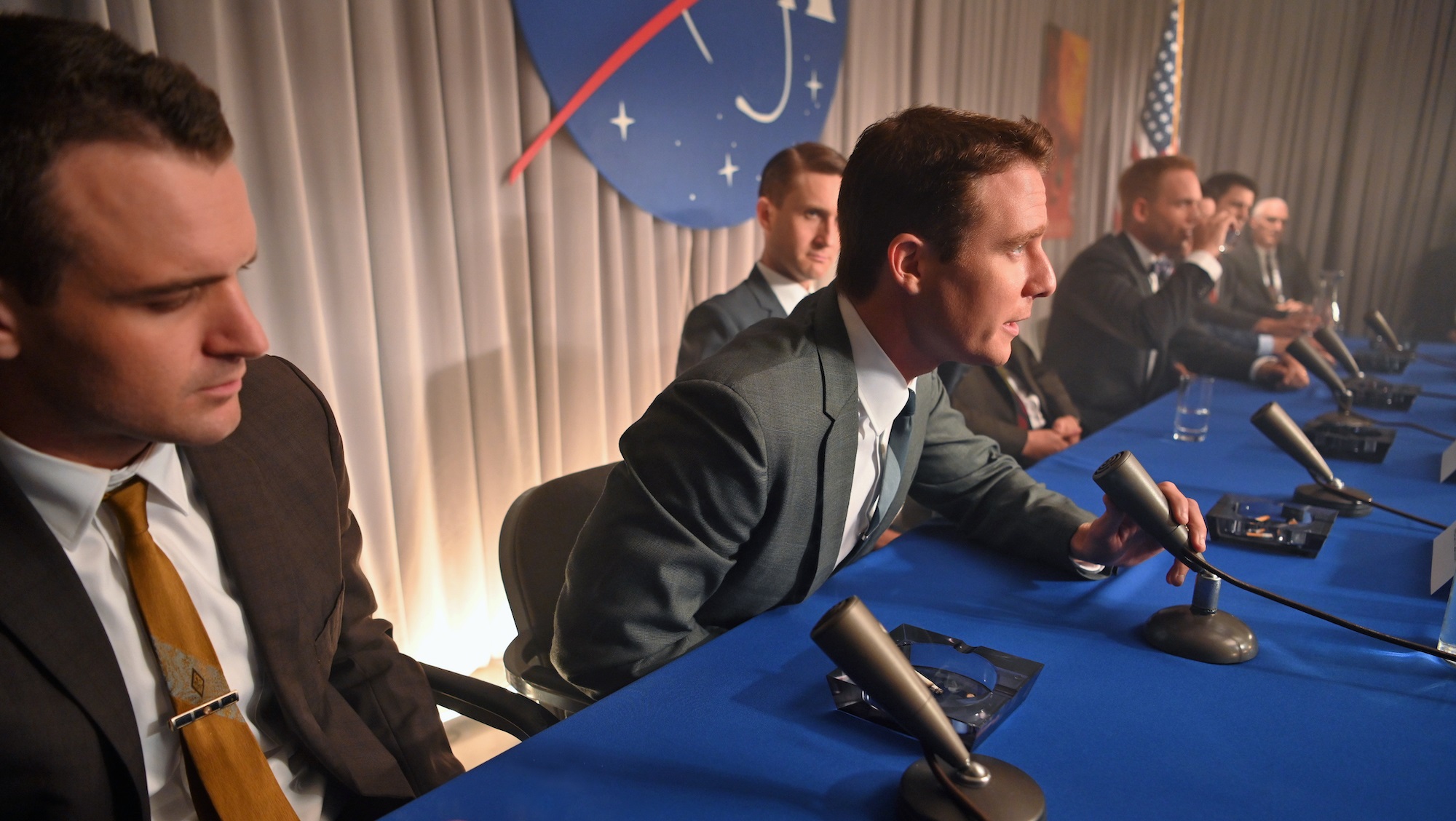A mixture of mid-century rah-rah patriotism and “Mad Men”-style professional rivalry, the series “The Right Stuff”—based on Tom Wolfe’s 1979 nonfiction book, already adapted once into a 1983 film—is a surprisingly compelling workplace drama once it dives into the strained interpersonal relationships between the American men competing to be the first in space. Less about space exploration itself and more about the Cold War tensions fueling it, “The Right Stuff,” which premieres on Disney+ on October 9, settles a little too often on nationalism and chauvinism as its characters’ guiding forces instead of pushing for deeper motivations. But when the series drops those elements and focuses on the frustrations and tensions between the members of the Mercury 7, “The Right Stuff” is unexpectedly thought-provoking in its consideration of what America wants out of its heroes.

When the Soviet Union’s space program launched the satellite Sputnik 1 into space in October 1957, that historic moment galvanized the American government into funding its own extraplanetary efforts. President Dwight D. Eisenhower’s proposal, which Congress approved in July 1958, transitioned the pre-existing National Advisory Committee for Aeronautics into the National Aeronautics and Space Administration (NASA). Their task was to catch up with—and then surpass—the Soviets, and various films such as “Hidden Figures” and “First Man” have focused on certain time periods in this conflict. “The Right Stuff” focuses on NASA’s early days: In 1959, engineers Bob Gilruth (Patrick Fischler) and Chris Kraft (Eric Ladin) are putting a team together of the country’s best test pilots. Premiere episode “Sierra Hotel” depicts NASA as a fledgling agency under phenomenal pressure; “What we’re doing here has consequences for the entire world … and we don’t have any time for do-overs,” Gilruth says.
Despite the great risk involved, everyone wants to be part of the action. Premiere episode “Sierra Hotel” follows Gilruth and Kraft as they invite more than 100 test pilots to a top-secret information session and then have to whittle them down to the seven needed for the Mercury Project, and most of these men are of a certain type. Tall, handsome, self-possessed. Every man seems to have a pair of aviators in his pocket, a glass of whiskey in his hand, and a woman who isn’t his wife on his arm. The only outlier is 38-year-old John Glenn (Patrick J. Adams), a war hero fighter pilot increasingly concerned about his legacy.
A devout Christian, Glenn rarely drinks alcohol, doesn’t flirt, and is focused primarily—and practically singularly—on the potential of being the first man in space. He’s convinced that he deserves the honor, and that surety puts him at odds with the other members of the Mercury 7, in particular Alan Shepard (Jake McDorman, doing his best Don Draper), a dashing pilot who rolls his eyes every time Glenn talks. Also in the mix are Gordon Cooper (Colin O’Donoghue), worried that his separation from his wife Trudy (Eloise Mumford) will ruin his chances of getting into the program; Gus Grissom (Michael Trotter), who holds a longstanding grudge against Gordo; and Deke Slayton (Micah Stock), Scott Carpenter (James Lafferty), and Wally Schirra (Aaron Staton). The final three are the most sparsely developed throughout the five episodes of “The Right Stuff” provided for review; Carpenter is given the least attention, but the character traits “handsome” and “antiracist” aren’t so bad.

Instead of equally building out the pilots, “The Right Stuff” uses the Glenn/Shepard contrast and the Gordo/Trudy mistrust to pose larger questions about what the Mercury 7 stood for. Some of these musings get repetitious quickly—there are too many scenes of Gordo being confused as to why pious Glenn won’t hang out with “the guys,” when all they seem to do is drink and cheat on their wives—but they become more engaging when “The Right Stuff” wonders if Glenn is using his virtue as a way of shaming, and implicitly insulting, the other men. Although Adams never really looks like Glenn, he effectively ping-pongs between what seems like selfless encouragement and self-serving condescension, and that duality is a good contrast to McDorman’s confident recklessness. Their performances as co-leads is what keeps “The Right Stuff” gripping, especially in the episodes “Advent” and “Kona Kai Séance,” the latter of which includes an argument between the two that is the series’ best scene so far.
Although the show never really interrogates the jingoistic factors that led to the Space Race (characters instead parrot clichés like “Our very way of life is at stake” to explain their motivations), or the systemic racism that led to an all-white group of men as the Mercury 7, “The Right Stuff” also surprises in the historical details it doesn’t gloss over. Operation Paperclip, in which the U.S. government recruited Nazi scientists to help in their Space Race efforts after World War II, is mentioned, as is how female pilots appealed to NASA to be considered for the astronaut program, to little success (Netflix documentary “Mercury 13” is worth watching for more context). Other subplots, like one involving LIFE magazine’s coverage of the pilots and how the men were paid by the publication in exchange for exclusive access, help communicate how phenomenally famous they became. But what is most compelling about “The Right Stuff” is the question of what the Mercury 7 were supposed to symbolize, and how the impossible stress of their task created fissures within a group that was meant to demonstrate the best of this country. Those considerations are when “The Right Stuff” is at its most thoughtful, and its riskiest, in puncturing the halcyon glow of American artifice.
Five episodes screened for review.












